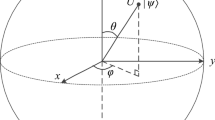Abstract
The scheduling problem in multi-automated guided vehicles (AGVs) system involves the job-shop scheduling problem and the vehicle routing problem. In the real world, the scheduling problem is limited by some constraint conditions such as the system should be able to avoid collisions and route correction is asked to be easily realized. This paper studies the scheduling and collision-free routing problem of AGVs. Mathematical programming model is given for this problem, and the algorithm is improved based on multi-objective programming to optimize the pheromone matrix. By calculation using available test problems, the performance of the two methods is compared. The improved ant colony algorithm is empirically evaluated. The result shows that the mathematical programming model has good effect but limited application scope. The improved algorithm improves the performance of the existing algorithm, and finally, the rationality of the improved algorithm for large instance key parameter settings and scheme selection is verified by eleven test samples.


Similar content being viewed by others
References
Theorin A, Bengtsson K, Provost J et al (2017) An event-driven manufacturing information system architecture for Industry 4.0. Int J Prod Res 55(5):1–15
Uzsoy R (1994) Scheduling a single batch processing machine with non-identical job sizes. Int J Prod Res 32(7):1615–1635
Johnson SM (1954) Optimal two- and three-stage production schedules with setup times included. Naval Res Logist Q 1(1):61–68
Zhao X, Guo X (2018) Branch and bound algorithm for solving hybrid flow shop robotic cells scheduling problem with blocking. J Comput Appl 38(7):2095–2099
Priore P, Ponte B, Puente J, Gómez A (2018) Learning based scheduling of flexible manufacturing systems using ensemble methods. Comput Ind Eng 126:282–291
Shu H, Zhao G, Zhao D (2010) Two kinds of heuristic rules in synthesis scheduling of FMS. Manuf Technol Mach Tool 7:29–32
Sobeyko O, Mönch L (2016) Integrated process planning and scheduling for large-scale flexible job shops using metaheuristics. Int J Prod Res 55(2):392–409
Blazewicz J, Burkard RE, Finke G et al (1994) Vehicle scheduling in two-cycle flexible manufacturing systems. Math Comput Model Int J 20(2):19–31
Elias X, Paraskevi Z, Andreas N (2016) Path planning and scheduling for a fleet of autonomous vehicles. Robotica 34(10):2257–2273
Dorigo M, Maniezzo V, Colorni A (1996) Ant system: optimization by a colony of cooperating agents. IEEE Trans Syst Man Cybernet Part B Cybernet 26(1):29–41
Fox B, Xiang W, Lee HP (2007) Industrial applications of the ant colony optimization algorithm. Int J Adv Manuf Technol 31(7-8):805–814
Zhang S, Wong TN (2017) Flexible job-shop scheduling/rescheduling in dynamic environment: a hybrid MAS/ACO approach. Int J Prod Res 55(11):3173–3196
You X, Liu S, Lv JQ (2017) Ant colony algorithm based on dynamic search strategy and its application on path planning of robot. Control Decis 3:29–32
Navarro G (2001) A guided tour to approximate string matching. ACM Comput Surv 33(1):31–88
Mao C, Xiao L, Yu X, Chen J (2015) Adapting ant colony optimization to generate test data for software structural testing. Swarm Evol Comput 20:23–36
Mao C, Yu X, Chen J, Chen J (2012) Generating test data for structural testing based on ant colony optimization. In: Proceedings of 12th International Conference on Quality Software (QSIC’12), pp 98–101
Acknowledgements
The tenth Graduate Innovation Fund of Wuhan Institute of Technology (Grant Nos. CX2017075, CX2018199, CX2018206).
Author information
Authors and Affiliations
Corresponding author
Additional information
Publisher's Note
Springer Nature remains neutral with regard to jurisdictional claims in published maps and institutional affiliations.
Rights and permissions
About this article
Cite this article
Yi, G., Feng, Z., Mei, T. et al. Multi-AGVs path planning based on improved ant colony algorithm. J Supercomput 75, 5898–5913 (2019). https://doi.org/10.1007/s11227-019-02884-9
Published:
Issue Date:
DOI: https://doi.org/10.1007/s11227-019-02884-9




